WILLIAM WALLACE AND ROBERT THE BRUCE. FRIENDS OR FOES?
WILLIAM WALLACE AND ROBERT THE BRUCE. FRIENDS OR FOES?
We have very little historical evidence that could shed light on the relationship between William Wallace and Robert the Bruce (the future King Robert I of Scotland). There is actually no solid historical evidence that they ever met, although they almost certainly did cross paths at some point. It may have been Bruce who knighted Wallace in 1297‐98. But were they friends or foes?
William Wallace and Robert the Bruce were two leaders who fought in what we now call the First War of Scottish Independence. But in reality, the two fought quite separate wars, with somewhat different goals. Wallace's war began in 1297 and lasted until 1304. His objectives were to rid Scotland of the English regime and reinstate John Balliol as King of Scots. Bruce, although he did come out in rebellion briefly at stages between 1297 and 1304, primarily fought his war between 1306 and 1328, after Wallace's death, and he fought for his own position as King of Scots.
Both Wallace and Bruce were of a similar age, Wallace being born c. 1270 and Bruce 1274. But that's where the similarities end. Wallace was the son of Alan Wallace, possibly a crown tenant in Ayrshire, and therefore was of the lesser nobility, whereas Bruce was a high-ranking noble with a claim to the throne of Scotland.
To separate the two men even further, Wallace was not the first-born to his parents and therefore inherited no lands. He would have to make his own way in the world, and he did so as an archer, although the evidence suggests that by 1296-97 he was an outlaw. Thus, Wallace and Bruce were from completely different backgrounds and lived completely different lives.
In 1297 Wallace ruthlessly displayed his hatred for the English regime in Scotland with his terrifying night attack on the Scottish town of Lanark, where he butchered the local English sheriff. A few months later he joined forces with Andrew de Moray and defeated the English at the battle of Stirling Bridge, and later was made Guardian of Scotland. Unfortunately Moray died from his wounds sustained at Stirling Bridge and sole command of the Scottish army was Wallace’s. In 1298 he was defeated by King Edward I of England at the battle of Falkirk.
In the movie Braveheart, Bruce betrays William Wallace at Falkirk and then following Wallace's execution, he is inspired by him. And since Bruce began his war in 1306, a year after Wallace's death, it has become a popular belief that he carried on the war after Wallace and was inspired to do so by the brutal death of his fellow Scot. But this is likely not true.
Wallace was a supporter of John Balliol, the deposed King of Scots, and throughout his entire career he never ceased to declare himself Balliol's loyal man. Bruce, as we know, had his own dynastic ambitions and provided Wallace with very little, if any, support. Neither man seems to have openly supported the other.
The story of Bruce betraying Wallace at the battle of Falkirk is almost certainly not true, but his absence and lack of support suggests he didn't view Wallace as an ally. Personally, I don't think Bruce was too keen on him, especially if he was not supportive of his claim to the Scottish throne.
In a rigid medieval society, Bruce, a high-ranking noble with a claim to the throne, possibly viewed Wallace, a former outlaw of the lesser nobility, as a low-born troublemaker who had no right to be leading Scotland or its armies.
But how did Wallace view Bruce? Well, unfortunately, since Wallace was executed in 1305, we are robbed of his reaction to Bruce becoming King of Scots in 1306. Would Wallace, a John Balliol supporter, have supported Bruce after he had murdered his way to the throne?
Well, both his brothers, Malcolm and John, supported Bruce at different times, therefore it is reasonable to assume Wallace would also have fought for Bruce. It is certainly worth wondering how the career of Wallace would have developed had he survived to see Bruce become King of Scots.
It would be an overstatement to claim Bruce and Wallace were enemies, but the two men were certainly not good friends or allies, as far as the evidence suggests. Bruce had his eye on the throne and he would stop at nothing to get it; Wallace, an outlaw who supported the deposed King of Scots, John Balliol, might therefore have been a hindrance to him by 1305.
There is no record of Bruce speaking out in Wallace's defence when the latter was on the run from the English and the Scots in 1304-1305. Even when the Scottish noble John de Menteith captured Wallace, we hear nothing from Bruce. By then he had obviously once again sworn fealty to the English king, and it is possible that, just like Menteith, he would have captured Wallace if the chance had arisen.
What's very interesting is that William Wallace is not mentioned at all in John Barbour’s long narrative poem, The Brus, written in c. 1375. The poem tells of Bruce's actions in the First War of Scottish Independence but not once does it mention Wallace, who fought two major battles, invaded northern England, became Guardian of Scotland, and was brutally executed, all in the "same war." Very odd.
To me, this and the rarity of Wallace's name in contemporary Scottish accounts, seems like a possible attempt to write Wallace out of history. Indeed, the earliest Scottish account which mentions Wallace in any detail was written over 70 years after his death and it wasn't until the 15th century when Wallace's name became prominent in Scottish history. Therefore, was it the Scottish rulers of the 14th century who prevented Wallace a place in history? We may never know for sure.
According to Andrew Fisher in his book, William Wallace:
"Bruce’s whole relationship with Wallace was a strange one, but it may well be that the clue to the question of Wallace’s reputation is to be found in certain of Bruce’s actions once he became king. It must be remembered that, prior to the murder of Comyn, Bruce’s behaviour had always been dictated by a degree of self-interest absent in Wallace.
His family had always stressed the strength and legitimacy of its claim to the throne. Bruce himself fought for years to establish that legitimacy against the claims of Edward II. It might not serve his purpose in this struggle to have his name linked with that of Wallace, a convicted traitor and outlaw.
This question of legitimacy may explain the otherwise surprising omission of Wallace’s name from Barbour’s account of Bruce. Even in the famous speech which he puts into his hero’s mouth at Bannockburn, Barbour can find no place for a mention of Wallace. Uplifting though Bruce’s address is, noble as its sentiments are, he does not in Barbour’s report call upon the name of Wallace to inspire his army.
It may not be irrelevant that after the completion of his work Barbour received first a gift of money and then a pension from Robert II. There was again war with England. Barbour would thus fulfil the role Blind Harry gave himself at the time of James III, if with different motives; to produce a story which would stir and unite a people governed by a weak king in the face of the enemy. If this argument is correct, it makes Barbour’s treatment of Wallace the more striking.
More significant, however, because of the firm evidence, is Bruce’s attitude to Menteith, the traditional villain in the story of Wallace’s capture. It was noted earlier that Menteith, in seizing Wallace, was acting on the instructions of Edward, to whom he was bound by his oath of loyalty. It is entirely possible that Comyn, Lindsay, or Graham might have played Menteith’s role had opportunity offered.
But that opportunity, and with it the loathing of posterity, fell to Mentieth. If in the capture of Wallace Menteith had been acting by reason of his oath to Edward, he was not averse to an attempt to lay hands upon the possessions of those who had joined Bruce in 1306. Yet, in 1309, Bruce accepted Menteith into his
peace and bestowed lands upon him.
Menteith’s name, further, was one of those associated with the Declaration of Arbroath. Menteith, first for the Scottish cause, then Edward’s man, and finally a supporter of Bruce, did not suffer in the latter’s eyes because he had handed Wallace over to the English any more than he did by his shifts of allegiance.
If your years after Wallace’s death, Menteith was received by Bruce and was subsequently so to be established that he was involved in the Declaration of Arbroath, we are entitled to wonder whether it was Wallace’s reputation rather than that of Menteith which had suffered in those years."
So Menteith, the man who "betrayed" Wallace, went on to serve king and country and was rewarded by Bruce for his service. It seems that Wallace was a forgotten man following his execution.
Thus, there was no place for Wallace in Scottish history in the first half of the 14th century, and this is probably why the vast majority of contemporary accounts on Wallace were actually written by the English.
Of course, documents in Scotland could have been lost or destroyed in the war, but that doesn't answer the question of why Wallace's name only begins to appear in late-14th century Scottish accounts, and why he was omitted completely from John Barbour’s famous account of Robert the Bruce’s life. According to Andrew Fisher:
"Indeed it is with Bruce’s eventual success that we see the second stage of the deconstruction of Wallace’s reputation. It was not in Bruce’s interests to allow Wallace, an unrepentant Balliol supporter, a place in the pantheon of Scottish heroes.
Nor did Bruce’s biographer, John Barbour, treat Wallace with any sympathy. In modern terms, Wallace was a victim of spin, airbrushed from the fourteenth-century picture of the struggle for independence. The Bruce dynasty, and its successors, the Stewarts, both had their own agenda and created their own, successful, version of events."
It is quite ironic, if true, that Wallace was written out of history in the decades following his execution, not by his enemies the English, but by the Scots.
Based on the evidence available, it seems that Wallace and Bruce were neither friends nor foes. They were two different men, from different backgrounds, with different ambitions, fighting during the same period in history.
. . .
Picture depicting Bruce (left) and Wallace (right). Credit: the late Andrew Hillhouse.
Book sources:
The Wallace Book, by Edward J Cowan
William Wallace, by Andrew Fisher
In the Footsteps of William Wallace in Scotland and Northern England, by Alan Young and Michael J Stead



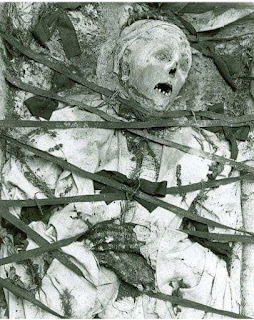
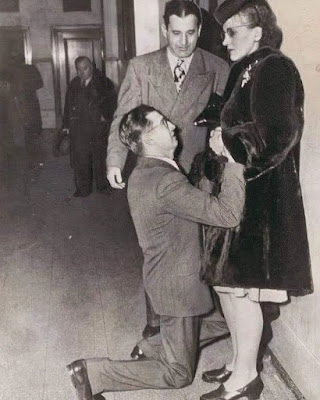
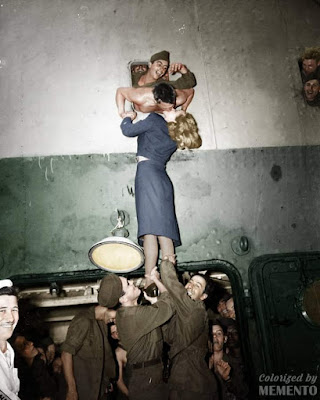
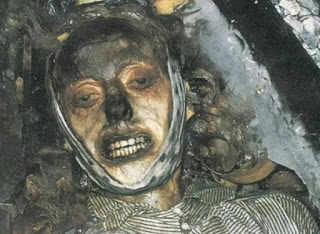

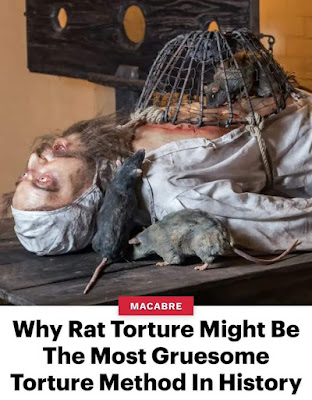
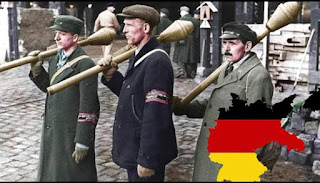
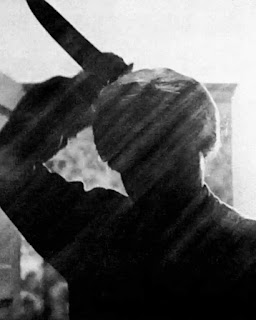

Comments
Post a Comment